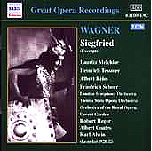This two-CD set presents two and one half hours of Wagner’s Siegfried: about 30 minutes are cut from the first act, about 50 from the second, and about 15 from the last. This leaves us with 150 minutes of music, sung and conducted by some of the most illustrious Wagnerians of the late ’20s and early ’30s. The Siegfried is Lauritz Melchior, possibly the finest Siegfried ever, certainly undisputed on discs from the ’20s to the late ’40s. His combination of power, authority, musicality, fearlessness, natural phrasing, sharp diction, and, well, sheer voice, is staggering: the early exchanges with Mime (an excellent, non-clownish Heinrich Tessmer) and the Forging Song precisely capture the character’s rambunctiousness; the moments in the forest in Act 2 are filled with wonder; his arrogance up against the Wanderer (of the smooth Rudolf Bockelmann) in Act 3 leads into his moments of discovery atop the mountain–by turns forceful, sensitive, and poetic; and his spectacular duet with his aunt/bride Brünnhilde is unsurpassed in passion and security.
Brünnhilde is the remarkable Florence Easton, a soprano who had the widest of repertoires (she sang Santuzza and Gilda as well as Brünnhilde and Isolde) and who, while not possessing the broadest of Wagnerian sounds, nonetheless retains utter clarity from top to bottom, has a real trill, and sings with confidence and poise.
As to the other singers, Maria Olszewska is a dark-hued, solid, solemn Erda with Emil Schipper’s acceptable Wanderer; a much finer Wanderer is Friedrich Schorr in Act 1. Eduard Habich sings Fafner and Alberich unimpressively, Nora Gruhn is an okay Woodbird, and the Mime of Albert Reiss in the Forging Song sequence is nothing special. Albert Coates’ conducting is thrilling; Robert Heger’s is more even-tempered, and all three orchestras impress. The sound, fixed up by Ward Marston, is as good as we could ask for given the dates of the recordings. All true Wagnerians should hear this. [9/16/2004]
































